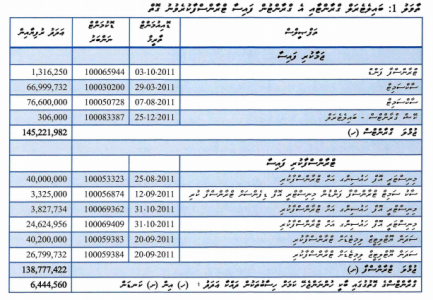Former Home Minister Hassan Afeef has questioned the government’s intention to carry out the death sentence under recently introduced regulations.
“I think they are just playing to the minds of the people because they say they want to protect the religion and protect the country as one of their campaign pledges,” he said.
Afeef – home minister between 2010 and 2012 – also questioned the ability of the current tainted judiciary to provide the certainty required for implementation of the death penalty under Islamic law.
“The judiciary might pass the sentence, there may be a verdict, but I don’t think the current regime will carry it out,” said Afeef.
“They know how politically influenced the judiciary is as the present government are the people who politically influence these judicial decisions – so they know why they make these decisions.”
Afeef’s comments follow further international headlines regarding the new regulations.
The AFP has described the recent murder conviction of a minor to be a “test case” for the new law, although the home minister had previously said that the rules will be applied retroactively to all pending death sentences.
In a statement released yesterday, the International Federation for Human Rights (FIDH) joined the growing international criticism accusing the Maldives government of being out-of-step with its international commitments.
“The decision to reinstate the death penalty in the Maldives, in particular against minors, is an outrage and gravely at odds with the growing international momentum towards abolition,” said FIDH President Karim Lahidji.
Lack of capacity
Speaking with Minivan News today, Afeef said the government’s attempts to carry out death sentences in accordance with Islamic Shariah were not possible with the criminal justice system as it is.
Afeef argued that those found guilty of such crimes beyond any doubt should be punished according to Islamic law, but questioned the capacity of the police and the judiciary to provide this certainty.
“According to Islam, when you pass the death penalty it has to be proven beyond doubt that the person has committed that crime and, according to the present situation – the present judiciary and the autocratic regime – we may find a situation where the person sentenced may not be the actual culprit,” he said.
The impartiality of the police and the judiciary has continued to be questioned this month, with the opposition Maldivian Democratic Party describing failures investigate the multiple charges against Supreme Court Judge Ali Hameed as “awe-inspiring”.
The statement said the failure of the police and the Judicial Services Commission to conclude investigations or to prosecute Judge Hameed were a clear indication of the status of the Maldives’ criminal justice system.
“Such a judge sitting on the supreme court bench is not recognised by any judicial or legal system in the world. And surely it is the general public who are facing injustice because of this,” said the party.
Hameed – who stands accused of appearing in a sex-tape as well as corruption – adjudicated on both the annulment the first round of last year’s presidential elections as well as the dismissal of the elections commissioner prior to parliamentary elections in March.
Both incidents were denounced by the international community, which has consistently called for judicial reform. Current Attorney General Mohamed Anil has pledged review and reform of the courts as part of the government’s legislative agenda.
Dheen and Qawm
Home Minister Umar Naseer’s January announcement that the government was making preparations to end the country’s 60-year moratorium on the death penalty culminated in the publication of new procedural regulations last month.
Following the gazetting of the new guidelines, Naseer said the chances of killing an innocent person after completing all the procedures in the regulation were “far-fetched” and “almost impossible”.
The regulation – which only allows implementation of death penalty when the sentence is delivered by the Supreme Court – will establish a death penalty committee to assure all procedures have been adhered to.
Mediation between the Islamic Ministry and the victim’s family is also mandated, with family members who are ‘warith’ (heirs in Shariah law) given an opportunity to pardon the convict with or without receiving blood money.
After having previously been opposed to the practice, President Abdulla Yameen announced a “change of heart” just weeks after winning his party’s presidential primary race last year.
Suggesting that “murder has to be punished with murder” in order to “save society”, Yameen embarked on a campaign of ‘dheen and qawm’ – religion and country – winning a drawn-out election in the second round last November.
